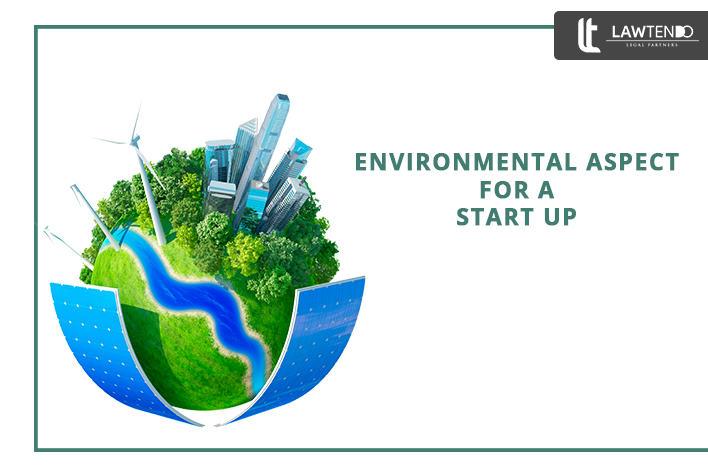What is the Importance of Environmental Laws in Startups

Date : 24 Jan, 2020
Post By Adv. Jai Dixit
Startups are the future of India. The rapid increase in the growth rate of many sectors has led to a spurt in the numbers and quality of startups in India. It can be categorized in various forms such as a company including a Singe-person Company, Limited-Liability Partnership or a Partnership firm. Each kind of entity is governed by separate laws, though there are certain common laws that are to be complied with. The Government of India has come up with many comprehensive policies to encourage Startups in India. A Private Limited Company or a Partnership firm registered under the Partnership Act, 1932 or a Limited Liability Partnership under the Limited Liability Partnership Act, 2008 in India can be called as a ‘Startup’ till seven years from the date of its Incorporation/ Registration for getting the benefits under the Government of India schemes. However, due to little development, India is running behind in the sector of environment protection. In fact, the 2013 Amendment to the Companies Act carefully brought in Corporate Social Responsibility (CSR) into the regulatory ambit, little or no efforts were put in to accelerate environment protection before the amendment. For a business, to be absolutely functional and work without any hassle, it is important that it is operated in strict adherence to all the legal compliances. Right from the beginning, the registration of the company, everyday transactions, employment practices, following safety measures and most important, but taken lightly, are the environmental regulations that need to be consciously adhered to. Here is an overview of certain aspects of the environmental laws which are important for a startup. Regulations And Legislations There is a long list of legislation that should be kept in mind and the compliances which need to follow without a miss according to their year of enactment: Water (Prevention and Control of Pollution) Act, 1974 (Water Act) Air (Prevention and Control of Pollution) Act, 1981 (Air Act). Environment (Protection) Act, 1986 (EP Act) – This is the umbrella act which entails the following rules: Wild Life (Protection) Act, 1972 Forest (Conservation) Act, 1980 Public Liability Insurance Act, 1991 Biological Diversity Act, 2002 National Green Tribunal Act, 2010 Environmental Permits In March 2016, the Ministry of Environment, Forests, and Climate Change adopted a new method of classifying the type of industry. A concept of “white industries” has emerged for classifying “non-polluting” companies. They do not need a permit or consent but need to notify the relevant State Pollution Control Board. For all the other industries like red, orange and green, there are certain environmental permits that are required depending on what kind of activity, the business is delving into and the size of the business. The company is given a score i.e. Pollution Index (PI) score, depending on the utilization of the resources, the air emissions, water effluents, and hazardous waste generated. It is mandatory to obtain consents and permits from the appropriate board. The PI score is allocated in the following categories: For Red category PI score of 60 and above. For example nuclear power plants, oil and gas extraction, etc. For Orange category PI score of 41 to 59. For example, food processing, paint blending, and pharmaceutical formulations etc. For Green category PI score of 21 to 40. For example tyres/rube retreating, polythene and plastic products etc. For the White category, PI score up to 20. For example solar power generation less than 25 megawatts. In India, the system of integrated permit exists where single permission suffices for a lot of consents and permits. For example, a combined application can be filed in the relevant State Pollution Control Board to obtain the ‘Consent to Establish’ and subsequently the ‘Consent to Operate’ under the Water Act, Air Act and Hazardous and Other Waste Rules, 2016. Renewal of Permits Generally, it is the State Pollution Control Board which has the power to determine the duration of consents and permits. In recent years, efforts have been made to streamline the validity of each industry. Generally, an initial ‘Consent to Establish’ has validity for a year that needs to be renewed, but it depends on the scale of the project. Other consents and validities such as ‘Consent to Operate’ under various air and water laws may vary from three to five years. In the case where renewal application is generally submitted 60 to 120 days before the date of expiration of the ‘Consent to Operate’. In case there has been any non-compliance, the State Board can cancel the renewal or will grant consent in case the non-compliance has been rectified. The recent laws have a provision for longer permits. For example, the E-Waste Rules and Hazardous and Other Waste Rules, 2016 provide validity of up to 5 years. It completely depends on the industry one is operating in. Most of the consent permits, licenses, and environmental clearances can be easily transferred only if they are obtained under the Environmental Impact Assessment (EIA).
a) E-Waste (Management) Rules, 2016;
b) Bio-Medical Waste Management Rules, 2016;
c) Construction and Demolition Waste Management Rules, 2016;
d) Hazardous and Other Waste (Management and
e) Transboundary Movement) Rules, 2016;
f) Manufacture, Storage and Import of Hazardous Chemicals Rules, 1989;
g) Coastal Regulation Zone Notification, 2011; h) Environment Impact Assessment Notification, 2006; and
i) Plastic Waste Management Rules, 2016).





